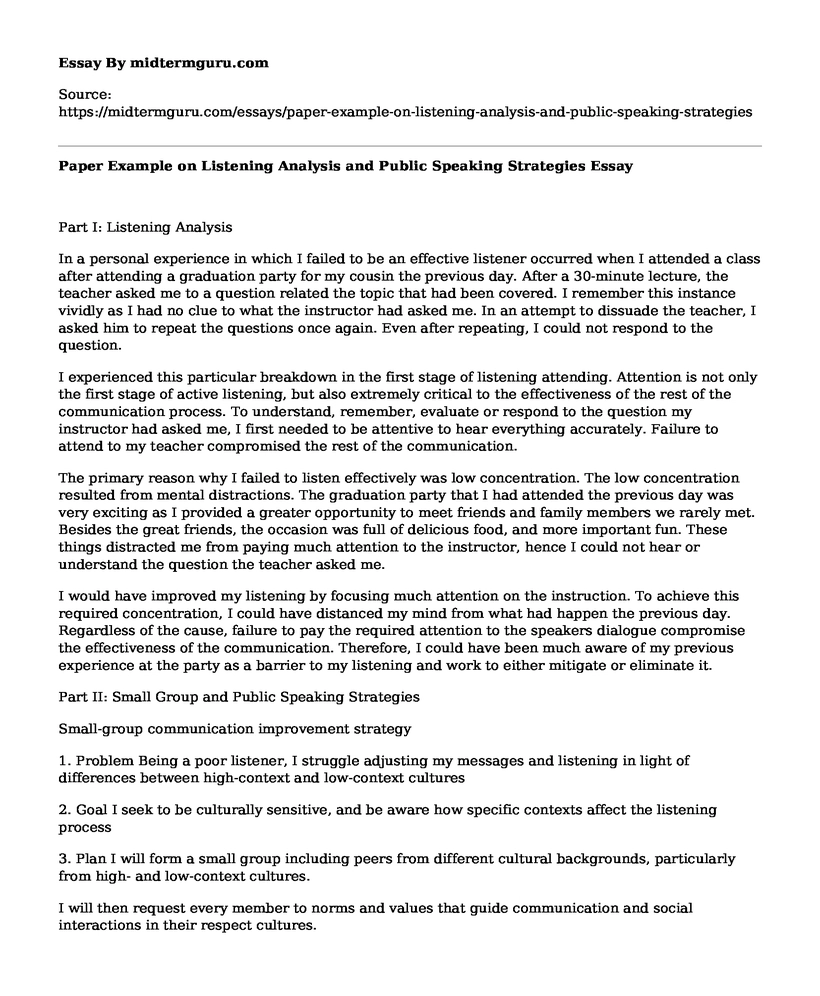Part I: Listening Analysis
In a personal experience in which I failed to be an effective listener occurred when I attended a class after attending a graduation party for my cousin the previous day. After a 30-minute lecture, the teacher asked me to a question related the topic that had been covered. I remember this instance vividly as I had no clue to what the instructor had asked me. In an attempt to dissuade the teacher, I asked him to repeat the questions once again. Even after repeating, I could not respond to the question.
I experienced this particular breakdown in the first stage of listening attending. Attention is not only the first stage of active listening, but also extremely critical to the effectiveness of the rest of the communication process. To understand, remember, evaluate or respond to the question my instructor had asked me, I first needed to be attentive to hear everything accurately. Failure to attend to my teacher compromised the rest of the communication.
The primary reason why I failed to listen effectively was low concentration. The low concentration resulted from mental distractions. The graduation party that I had attended the previous day was very exciting as I provided a greater opportunity to meet friends and family members we rarely met. Besides the great friends, the occasion was full of delicious food, and more important fun. These things distracted me from paying much attention to the instructor, hence I could not hear or understand the question the teacher asked me.
I would have improved my listening by focusing much attention on the instruction. To achieve this required concentration, I could have distanced my mind from what had happen the previous day. Regardless of the cause, failure to pay the required attention to the speakers dialogue compromise the effectiveness of the communication. Therefore, I could have been much aware of my previous experience at the party as a barrier to my listening and work to either mitigate or eliminate it.
Part II: Small Group and Public Speaking Strategies
Small-group communication improvement strategy
1. Problem Being a poor listener, I struggle adjusting my messages and listening in light of differences between high-context and low-context cultures
2. Goal I seek to be culturally sensitive, and be aware how specific contexts affect the listening process
3. Plan I will form a small group including peers from different cultural backgrounds, particularly from high- and low-context cultures.
I will then request every member to norms and values that guide communication and social interactions in their respect cultures.
I will learn and rehearse these elements with the diverse members.
next time, when I happen to engage in group communication I will not struggle to adjust my messages and listen in light of diverse cultural contexts
4. Test Measurability I am able to adjust my messages appropriately and listen effectively in different contexts
Public speaking improvement strategy
Problem I experience difficulties in managing stage fright as certain parts of my body feel very tense and rigid when I am giving a speech.
Goal I want to be a confident public speaker, and develop the ability to get up and speak to any type and size of audience and feel as if none is watching me.
Plan I will gain experiencing in talking to large audiences by reading literature on effective public speaking skills and practices
I will prepare a 10-minute speech and rehearse it in front of a mirror
I will seek a real audience like a class or church meeting to rehearse my speech again
When I face the task of talking to a large audience, I will speak confidently and avoid nonverbal cues that might diminish my presentation
Test Measurability I am able to speak to any size and type of audience with confidence and convey my message(s) effectively to it.
Part III: Presentation Topics and Research Ideas
Importance and ways of engaging an audience
Strategies for managing stage fright
The value of researching/preparing for a speech
Importance of cultural context in public speaking
Audience analysis
Time management in public speaking
Benefits of developing public speaking skills
Reference List
Colino, J. (2015). Audience engagement for presentations via interactive methods.
Gallo, C. (2010). The presentation secrets of Steve Jobs: How to be insanely great in front of any audience. Prentice Hall.
Zappa-Hollman, S. (2007). Academic presentations across post-secondary contexts: The discourse socialization of non-native English speakers. Canadian Modern Language Review, 63(4), 455-485.
Cite this page
Paper Example on Listening Analysis and Public Speaking Strategies. (2021, Jul 01). Retrieved from https://midtermguru.com/essays/paper-example-on-listening-analysis-and-public-speaking-strategies
If you are the original author of this essay and no longer wish to have it published on the midtermguru.com website, please click below to request its removal:
- Analysis of the Impact of Marketing Communication on Financial Performance With Respect to G2G Company
- Strategies of Discussing a Shared Problem - Paper Example
- Paper Example on Listening Analysis and Public Speaking Strategies
- General Discussion of Consumer Behaviour - Paper Example
- Essay Sample on Management of Customer Relationship
- Rebrand & Launch With Amazon: Maximizing Product Advertising Strategies - Essay Sample
- Knowledge and Learning in Business Success - Essay Sample







